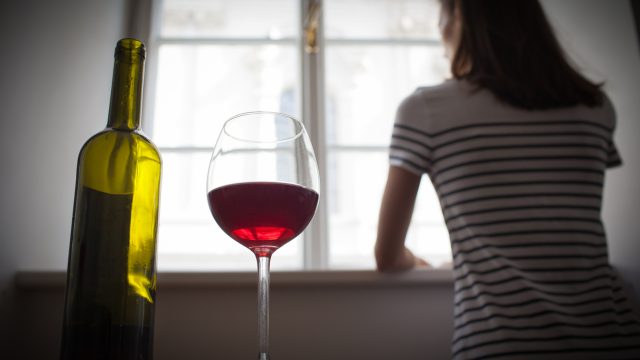The Easiest Way to Cut Back on Drinking, According to Experts
If you're trying to drink less alcohol, one thing can really help.

As much as you might enjoy it, drinking alcohol has a lot of downsides. Research has shown that booze can disrupt your sleep patterns, cause liver damage, and even increase your risk of dementia. The good news? "Research shows that some of the damage caused to the brain, liver, cardiovascular system, and gut will slowly heal when you stop drinking," according to Verywell Mind.
Whether you're recovering from addiction, concerned about the link between alcohol and dementia, or simply committing to your overall wellness, read on for one surprising tip on how to cut back on—or completely stop—drinking.
READ THIS NEXT: Brad Pitt Credits This Huge Star With Helping Him Overcome Addiction.
One simple activity can give you insight into your drinking habits.

If you've found that your alcohol intake seems to have increased recently, you're not alone. Alcohol consumption has increased in the U.S. since the beginning of the pandemic. But with the growing popularity of a public health initiative called Dry January, which challenges participants to give up alcohol for a month, people are becoming more and more aware of the benefits of reducing their alcohol intake.
People who have participated in Dry January describe all kinds of benefits, including better sleep, increased energy, weight loss, and skin improvement. Today.com reports that "Regular drinkers who abstained from alcohol for just one month were found to have a 'rapid decrease' in certain chemical messengers in the blood that are associated with cancer progression, a study found." In addition, "participants also saw improvements in their insulin resistance, weight and blood pressure."
There are a lot of approaches to cutting back—or stopping—your alcohol intake, but a great way to start is to write about your drinking, as well as related goals.
READ THIS NEXT: The Real Reason Kelly Ripa Stopped Drinking Alcohol.
Writing about your drinking is a helpful first step for many.

Taking stock of your alcohol use and making a plan to cut back can be a necessary step in the process. Laura McKowen, the author of We Are the Luckiest: The Surprising Magic of a Sober Life and the founder of The Luckiest Club, told The New York Times that her journey towards sobriety began with a drinking journal. "Something very interesting happens when we put things on paper," says McKowen. "Because we have a lot of cognitive dissonance around drinking."
The New York Times suggests "[Taking] note of how much you're drinking, as well as the pros and cons of that consumption," so that you can be honest with yourself about your habits. Other ways you can use a journal to assist with your plan include listing the reasons you want to cut back on drinking, as well as writing down your limits and creating a calendar that has alcohol-free days, according to Harvard Health.
For more health news sent directly to your inbox, sign up for our daily newsletter.
Taking month off drinking has immediate benefits.

Once you've started writing about drinking and your plans to move forward, the next step may be to take time off from alcohol completely. According to University of Sussex researcher Richard de Visser, PhD, taking a month off drinking—whether it's January or any other time—is an effective way to cut back on (or stop) drinking. "The simple act of taking a month off alcohol helps people drink less in the long term," says de Visser. By August, participants in Dry January "are reporting one extra dry day per week," he says."There are also considerable immediate benefits: nine in ten people save money, seven in ten sleep better, and three in five lose weight."
To help with taking a month off, a support system can be helpful. If you're having a hard time sticking to your goal or just want some extra guidance, consider reaching out for professional support, whether it's to family, friends, or a 12-step program such as Alcoholics Anonymous.
Moderate drinking may have some health benefits—but the risks may not be worth it.

Some research shows that moderate drinking may possibly have health benefits, such as reducing the risk of stroke and diabetes. However, the Mayo Clinic warns that "eating a healthy diet and being physically active have much greater health benefits and have been more extensively studied," and that in addition, "even light drinkers (those who have no more than one drink a day) have a tiny, but real, increased risk of some cancers, such as esophageal cancer." Studies have also shown that a safe amount of beer can reduce the risk of heart disease.
If you decide not to stop drinking completely, know the recommendations for moderate drinking. The 2020-2025 Dietary Guidelines for Americans suggests an intake of two drinks or less in a day for men or one drink or less in a day for women. The Guidelines also caution against drinking any alcohol at all if you're pregnant, under the age of 21, have a medical condition, take medication that may interact with alcohol, or have an alcohol use disorder.
READ THIS NEXT: If This Happens When You Drink Alcohol, It Might Be Time to Stop.





















